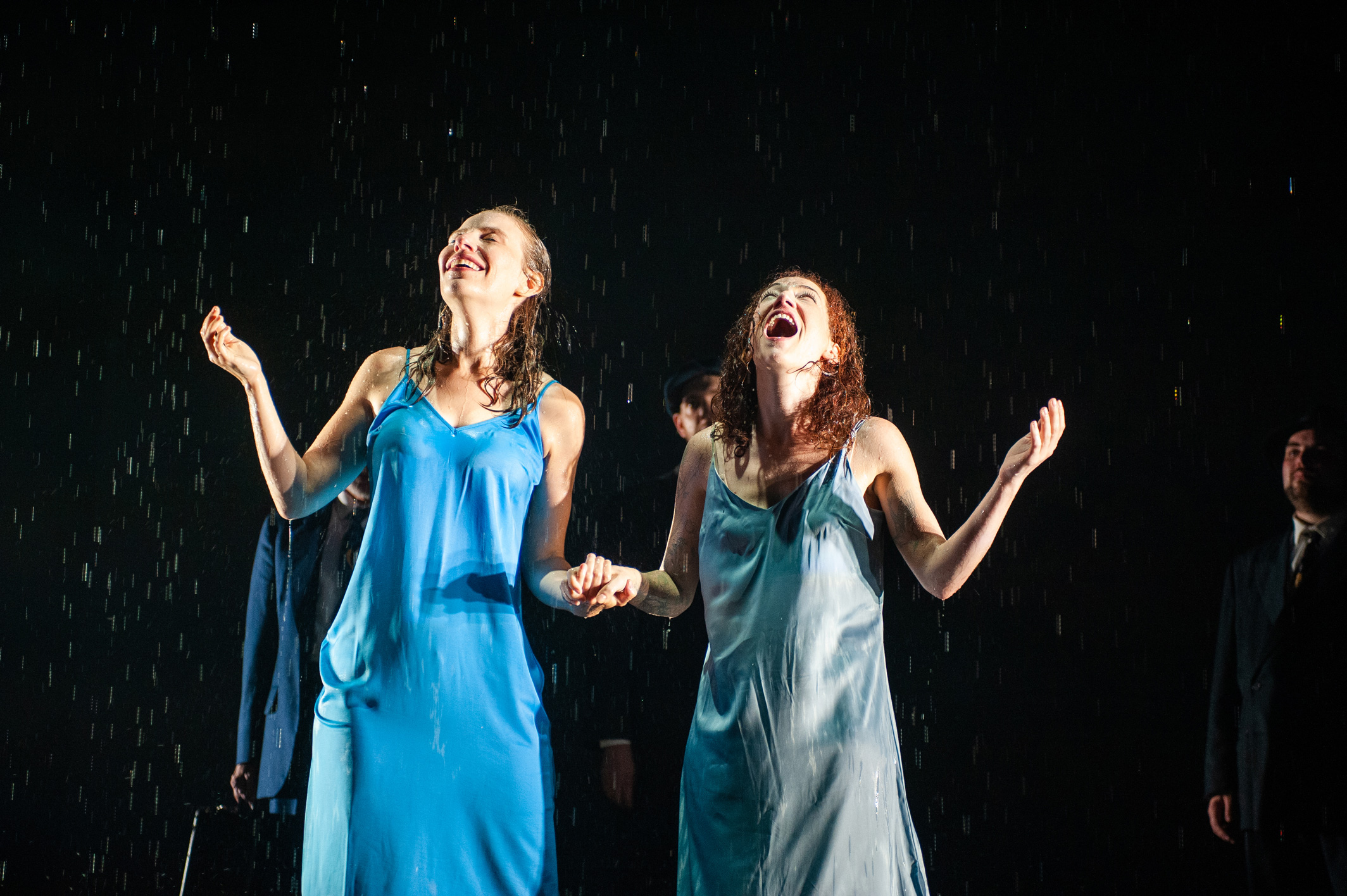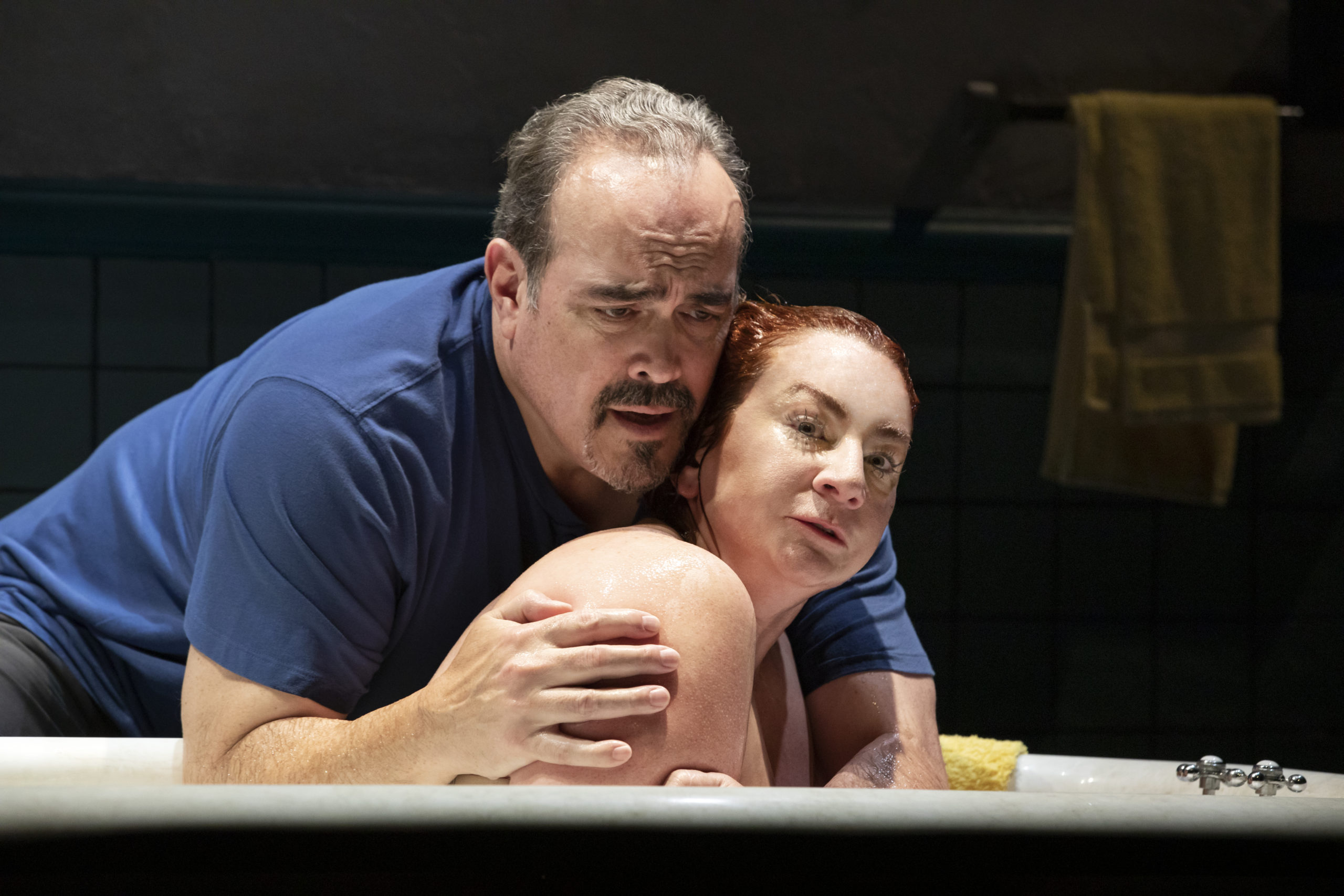King Lear and I go way back. It was the first Shakespeare play that I read of my own accord, back in high school, and I wrote one of my essays on the AP English test about the play. And of course, I've seen it performed a number of times. So I was particularly interested when CalShakes announced that they would host the world premiere of a new translation of King Lear, written and adapted by the terrific Marcus Gardley and directed by Eric Ting. This is the same team that brought us the magnificent black odyssey back before the pandemic, so that bodes well.
I'll add a note about the term "translation" here. The play was commissioned by the Play on! Project that began at the Oregon Shakespeare Festival and now exists as a stand-alone non-profit company called Play On Shakespeare. I've always had sort of mixed feelings about the project, which set out to make modern-language versions of all the plays in the Shakespeare canon, presumably without altering the meaning, preferably by restoring the original meaning that might have been lost as the language shifted under the plays.
This play, Lear seems to be a further adaptation of the translation Gardley did several years back as part of that effort. I'm a little unclear as to whether this is the translation itself, or whether that exists as a thing, and then further work went into creating this play for this production.
The Play
I'm not going to try to summarize King Lear here. Suffice it to say the basic, well-known plot of the aging Lear dividing his kingdom among his three daughters based on their professions of how much they love him is still here, along with all the resulting conflicts, madness, eye-gouging, and so on. However (and here is where I have to assume this is the adaptation, not just a modern "translation" of the Shakespearean text), the whole play is set in San Francisco's Fillmore district in 1969, which takes some real imagination to accommodate. The whole cast (but for one member) is black, and the character of Kent is explicitly the countess of Kent, because she needs to be a black woman. This is one of the clear places we have departed the original intent and text. Same when the Black Panthers show up. And eminent domain evictions for urban renewal.
To my ear, most of the language modernizations are fine. Gardley has a good ear and a good writing voice, so his changes there are pretty transparent. I would actually like to see a production of his modern translation of the original King Lear, which is what I thought this was going to be. It wasn't.
A friend of mine summarized the problem rather neatly at intermission, and I'll paraphrase: I would love to see a Marcus Gardley modernizaton of King Lear. I would love to see a Marcus Gardley play that riffs on King Lear to examine the issues of mid-20th-century urban issues. This isn't either one of those, and it doesn't work. Displacement by eminent domain is not the same as a king voluntarily dispersing his lands, or a father favoring his legitimate son over a bastard.
The Production
Here is where I'm struggling to delineate between production matters and matters of the play content. As I just noted, I think the translation of the text is fine, and the acting is generally strong and the technical designs are quite good--simple but not simplistic--things don't have to move around or change much, so the actors are the focus as they ought to be. And I'm pleased that the majority of the actors in the cast are local and quite good. In the current, downsized Bay Area theater scene, any work we can get for these artists is welcome, and it's reassuring to see so many artists I've been missing these past couple of years back on stage.
Any production of King Lear is going to live or die with the actor playing Lear (in this case, James A. Williams). He was generally strong, and has a powerful voice, though I felt he needed to modulate it a bit at times. Lear is a complex character, and a lot of that complexity can come through the variation of volume and tone in his voice. The daughters were generally strong, particularly Goneril (Leontyne Mbele-Mbong) and Cordelia (Sam Jackson). Regan (Emma Van Lare) had a few lapses in her lines, which is hard to take at the penultimate performance in the run. Dane Troy and Jomar Tagatac as half-brothers Edgar and Edmund do a terrific job. Troy particularly works well as "Tom", guiding his blinded father Gloucester (Michael J. Asbery, who has a wonderful, commanding voice). And the always wonderful Cathleen Riddley handles Kent very well, serving as the moral center of the play.
I would be remiss not to mention the excellent, live jazz soundtrack (sometimes augmented by the Black Queen (Velina Brown)) and the overall excellent blocking of the scenes. It's a very effective presentation, with the slight exception of a scene played to the extreme side of the stage, which is utterly invisible to part of the audience in the front rows.
Bottom Line
This feels like a wasted opportunity. With such a good writer and talented artists, this had the chance to be a real landmark production, as we saw with black odyssey. Unfortunately, neither the playwright nor the director seemed to know what they wanted to do, so instead we get a mashup that lurches from King Lear to the Fillmore and back, none of it fitting together. I hope Gardley can go back and find his Bay Area play hiding in the background of Lear. There are certainly enough touchpoints that he could manage it. But trying to incorporate the literal text and plot of King Lear into this completely different scenario is futile, and does a disservice to both.
I'll leave with just a couple of last comments. One of the choices I found inexplicable was the discarding of Lear's fool, who is such a key element of Shakespeare's play. There are lots of ways to interpret the fool, but this play chooses to replace the fool with a stand-up comic (who also sits down in one scene). There's nothing particularly wrong with that, as long as you're not trying to tell the story of Lear. But much of King Lear doesn't make sense without some incarnation of the fool. This strikes me as another case of trying to straddle the translation/adaptation chasm without a clear idea of why or how it will work. It also strikes me that Ting used a similar device (entirely out of whole cloth) in his production of Othello several years back. I didn't think that worked, either.
And finally, the powerful speech that Kent delivers to close the play, which is in some ways the whole justification for making Kent a woman, has the character noting how apt it is that a black woman has to clean up after everyone. That's a great message, but one that is sorely hampered by the fact that the mess in question was largely created by Lear's daughters, who are also black women. Again, a problem that seems to have been created by not knowing what play the writer and director actually want to do.
So I was terribly disappointed in this play. I had very high hopes and expectations, and feel that the artists were not well served by either the writer or the director. Eric Ting, who I deeply mistrusted after he made his CalShakes debut with Othello, had earned my trust with some really good work in subsequent years. Sadly, with this being his final production as he leaves CalShakes, I'm left with a disappointing memory.
I should note that the production closed yesterday, so you'll just have to take my word for it.


